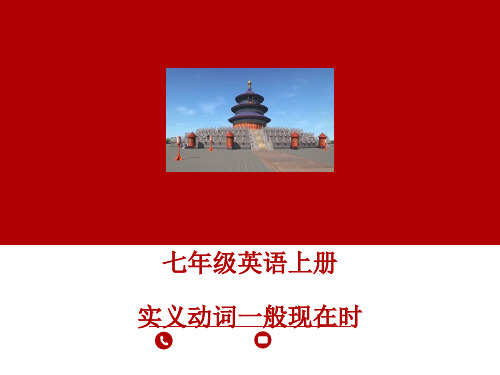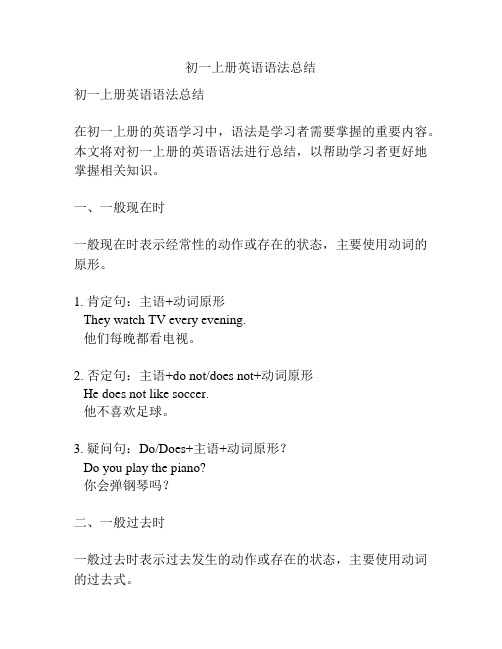一般现在时总复习 初一上
初一英语一般现在时、现在进行时及句型专项训练

So she was considering in her own mind (as well as she could, for the hot day made her feel very sleepy and stupid), whether the pleasure of making a daisy-chain would be worth the trouble of getting up and picking the daisies, when suddenly a White Rabbit with pink eyes ran close by her.天热得她非常困,甚至迷糊了,但是爱丽丝还是认真地盘算着,做一只雏菊花环的乐趣,能不能抵得上摘雏菊的麻烦呢?就在这时,突然一只粉红眼睛的白兔,贴着她身边跑过去了。
There was nothing so VERY remarkable in that; nor did Alice think it so VERY much out of the way to hear the Rabbit say to itself, “Oh dear! Oh dear! I shall be late!”(when she thought it over afterwards, it occurred to her that she ought to have wondered at this, but at the time it all seemed quite natural); but when the Rabbit actually TOOK A WATCH OUT OF ITS WAISTCOAT- POCKET, and looked at it, and then hurried on, Alice started to her feet, for it flashed across her mind that she had never before seen a rabbit with either a waistcoat-pocket, or a watch to take out of it, and burning with curiosity, she ran across the field after it, and fortunately was just in time to see it pop down a large rabbit-hole under the hedge.爱丽丝并没有感到奇怪,甚至于听到兔子自言自语地说:“哦,亲爱的,哦,亲爱的,我太迟了。
初一英语上册语法知识点总结归纳

初一英语上册语法知识点总结归纳
- 一般现在时:表示经常发生的动作或存在的状态。
句式结构:主语+动词+其他。
当主语是第三人称单数时,动词要用第三人称单数形式。
- 现在进行时:表示正在进行或发生的动作。
句式结构:主语+be 动词+动词 ing+其他。
- 一般过去时:表示过去发生的动作或存在的状态。
句式结构:主语+动词过去式+其他。
- 一般将来时:表示将来发生的动作或存在的状态。
句式结构:主语+will+动词原形+其他,或主语+be going to+动词原形+其他。
- There be 句型:表示某地有某物或某地存在某物。
句式结构:There is/are+主语+地点状语。
- 形容词的比较级和最高级:用于比较两个或两个以上的人或事物。
比较级用于两者之间的比较,最高级用于三者或三者以上的比较。
- 代词:包括人称代词、物主代词、反身代词等,用于代替名词或起到连接作用。
- 冠词:包括定冠词 the 和不定冠词 a/an,用于修饰名词,特指或泛指某个人或事物。
- 介词:用于表示时间、地点、方位、方式等,常见的介词有 in、on、at、for、with、by 等。
- 数词:包括基数词和序数词,用于表示数量和顺序。
- 陈述句、疑问句、祈使句和感叹句:陈述句用于陈述事实或观点,疑问句用于提出问题,祈使句用于表示请求、命令、建议等,感叹句用于表示感叹语气。
外研版七年级上册英语: 实义动词一般现在时复习课件

• 表示个人___爱__好_______、_____习__惯________
They like football.
playing
I like drawing pictures
表示___客_观__真_理________或___或_自__然_现__象___________
基本结构
三单主语
肯定句:主语+实义动词第三人称单数+其他 He likesLeabharlann playing football.
否定句:主语+ ___d_o_e_s_n_'t_____ + 实义动词原形+其他 does not
He doesn't like playing football.
三单主语
一般疑问句:____D_o_e_s___+主语+实义动词原形+其他?
comes
drives
come________ drive________
• write_w_r_i_t_e_s__ let____l_e_t_s_
watch_w_a_t_c_h_e_s_
• finish_f_i_n_i_s_h_e_s teach_t_e_a_c_h_e_s_ go___g_o_e_s__
The sun rises from the east and sets in the west.
The moon goes around the earth.
第三人称单数
第三人称单数主语
• 人称代词he , she , it • 单个人名、地名、河、湖、海 • 单数名词和不可数名词
a gril
2018-初一英语语法一般现在时知识点复习-范文word版 (2页)

2018-初一英语语法一般现在时知识点复习-范文word版本文部分内容来自网络整理,本司不为其真实性负责,如有异议或侵权请及时联系,本司将立即删除!== 本文为word格式,下载后可方便编辑和修改! ==初一英语语法一般现在时知识点复习初一英语语法——一般现在时一般现在时表示经常性或习惯性的动作,或表示现在的特征或状态。
其动词形式是:动词原形(只有第三人称单数作主语时除外,要加-s)其疑问句和否定句需要用助动词do或does1)肯定句用行为动词原形表示Theygetupveryearlyeverymorning.他们每天早晨起来很早。
Ivisitmygrandparentsfourtimesamonth.我一个月去看望祖父母四次。
2)否定句用don’t+动词原形来表示WedonotgoshoppingonSundays.我们周日不去购物。
Idon’tthinkyoulikethiscolour.我想你不喜欢这个颜色。
3)一般疑问句则是把助动词do提前至句首,后面动词用原形。
回答时,肯定用“Yes,主语+do”;否定句用“No,主语+don’t”。
–Dotheygotoschoolatseveno’clock?他们七点去上学吗?--Yes,theydo.--Doyoulikethisskirt?你喜欢这条裙子吗?--No,Idon’t.不,我不喜欢。
一般现在时用来表示经常的或习惯性的动作,常与以下的时间状语连用:often经常,always总是,sometimes有时,usually通常,everyday/week每天/周等。
Heusuallygoestoschoolbybike.通常他骑车上学。
初一上册英语语法总结

初一上册英语语法总结初一上册英语语法总结在初一上册的英语学习中,语法是学习者需要掌握的重要内容。
本文将对初一上册的英语语法进行总结,以帮助学习者更好地掌握相关知识。
一、一般现在时一般现在时表示经常性的动作或存在的状态,主要使用动词的原形。
1. 肯定句:主语+动词原形They watch TV every evening.他们每晚都看电视。
2. 否定句:主语+do not/does not+动词原形He does not like soccer.他不喜欢足球。
3. 疑问句:Do/Does+主语+动词原形?Do you play the piano?你会弹钢琴吗?二、一般过去时一般过去时表示过去发生的动作或存在的状态,主要使用动词的过去式。
1. 肯定句:主语+动词过去式He watched a movie last night.他昨晚看了一部电影。
2. 否定句:主语+did not+动词原形I did not finish my homework.我没有完成作业。
3. 疑问句:Did+主语+动词原形+?Did they go to the park yesterday?他们昨天去公园了吗?三、一般将来时一般将来时表示将来要发生的动作或存在的状态,主要使用助动词will。
1. 肯定句:主语+will+动词原形We will have a party next Sunday.下个星期天我们将开个派对。
2. 否定句:主语+will not+动词原形She will not go to school tomorrow.她明天不去上学。
3. 疑问句:Will+主语+动词原形+?Will you visit your grandparents this weekend?这个周末你会去看望你的爷爷奶奶吗?四、现在进行时现在进行时表示现在进行着的动作,主要使用be动词的现在分词。
1. 肯定句:主语+am/is/are+动词的现在分词She is reading a book now.她现在正在看书。
外研英语初一上学期一般现在时的复习

He doesn’t get up very early.
Does he get up very early? Yes, he does/ No, he doesn’t.
5.The panda eats bamboo.
The panda doesn’t eat bamboo. Does the panda eat bamboo? Yes,it does/ No, it doesn’t.
read novels listen to the music go to the cinema go to the concert go to watch the football match play games play the piano go online speak English go to the park
对下列句子画线部分提问: 1. I get up at six o’clock.
When do you get up?
2. They usually go to the park on Sunday.
What do they usually do on Sunday?
3. The elephants like eating fruits.
定义:
一般现在时:1、表达经常性或习惯性的动作。 2、表示现在的状态。
例如:
1、我们每天都上学。
We go to school every day.
2、下课后我们打扫教室。
We clean the classroom after class.
3、有时我们在操场上踢足球 。
We sometimes play football on the playground.
七年级上册一般现在时

• Do_e_s__Li Ping h_a_v_e_a soccer ball?
• 4.Does she have a CD?(做肯定回答)
• Yes,shedoe_s___ .
• 5.He has a baseball bat.(变否定句)
•
•
H6.eYoduo_eh_as_vn_e’t_a_v_ho_al_lev_y_eb_aalbl.a(s一eb般all疑ba问t. 句)
17
第十七页,共30页。
把下面的句子变一般(yībān)疑问句并作肯、否定回 答,否定句.
1.He has a TV. 2.She has an alarm clock. 3.Sally plays ping-pong every day. 4.My sister has a nice ring. 5.Her parents have 3 sons.
8
第八页,共30页。
I have a basketball.
: 一般(yībān)疑问句 Do you have a basketball?
肯定 回答: (kěndìng) Yes, I do
否定 回答: (fǒudìng) No, I don’t
否定句:
I don’t have a basketball.
变疑问,往前提,句末问号莫丢弃。 变否定,更容易,be后not莫忘记。
疑问否定任你变,句首大写(dàxiě)莫迟疑.
4
第四页,共30页。
5
第五页,共30页。
1.It is a red pen.
2.He is Eric.
3.That is my map.
4.Her name is Mary.
初一初二英语语法知识点归纳总结

初一初二英语语法知识点归纳总结初中是学习英语的重要阶段,想要学好在初中学好英语需要对所学的知识进行归纳总结以便复习。
以下是分享给大家的初一初二英语语法知识点,希望可以帮到你语语法知识点,希望可以帮到你! !初一初二英语语法知识点1. The Simple Present Tense 一般现在时一般现在时最容易出现错误的地方是在第三人称单数形式上。
everyone ,everybody ,no one ,nobody ,someone ,somebody somebody,,nothing nothing,,everything everything,,anything anything,,以及none none,,each each,,every 引导的名词或代词作主语时,谓语动词要用单数形式。
例如:Everyone is here. 大家都在这里。
No one knows his name.没有人知道他的名字。
2. The Present Continuous Tense 现在进行时现在进行时最容易出现错误的地方在动词的现在分词形式上,我们在复习的时候要特别注意不规则动词的变化形式。
例如:swimming swimming,,beginning beginning,,putting putting,,taking taking,,buying buying。
3. The Simple Future Tense 一般将来时1) 一般将来时表示将来某个时间要发生的动作或存在的状态,也表示将来经常或反复发生的动作,常与表示将来的时间状语连用,如:tomorrow tomorrow,,next week ,next year 等。
其构成为等。
其构成为"""助动词助动词 will +动词原形动词原形"""。
